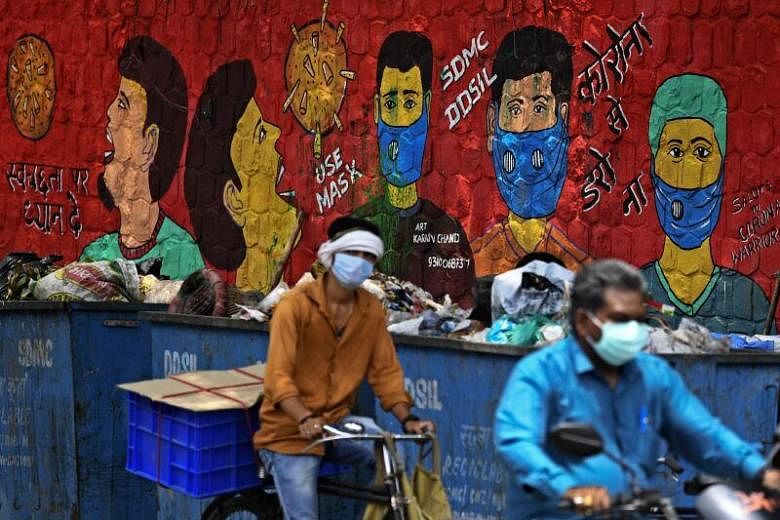NEW DELHI - A glimmer of hope has emerged for the Indian capital in its fight against Covid-19 with a steady fall in daily new infections. New cases have dropped from an average of 3,400 per day for the week beginning June 19, to a daily average of 1,430 for the seven days since July 14. Delhi, in fact, recorded 954 cases on July 20, its lowest daily increase since May 27.
Once the worst hit city in the country, it currently has 15,288 active cases and 3,690 deaths. A total of 106,118 people have recovered so far. This potential inflection point comes on the back of aggressive testing that has resulted in a higher rate of detection, leading to the subsequent isolation and treatment of patients. Tests in Delhi increased almost threefold, from an average of about 7,110 per day during the week beginning June 12 to an average of 19,659 for the week beginning July 14.
Acknowledging that aggressive testing was the first step of the containment strategy, Mr Akshay Marathe, a spokesman for the Aam Aadmi Party that governs Delhi, told The Straits Times that the early adoption of home quarantine for mild and asymptomatic cases, together with public awareness campaigns advocating the practice, had encouraged more people to come out and get tested .
"There are policies (in several states) that mandate compulsory quarantine in government facilities, which has been a huge, huge hurdle in getting people to come forward to actually get tested," he said. More than half the active cases in Delhi as of July 21 were in home quarantine and placed under regular observation of state health workers.
Some have argued that if Delhi is able to consolidate this gain over the next few weeks and curb the spread of the pandemic, it would mean that the city has passed its peak of infections. However, concerns remain around the false negatives that the rapid antigen test kit being used, one developed by the South Korean firm SD BIOSENSOR, can lead to. Around 70 per cent of the tests in Delhi are being conducted using this kit.
The Indian Council of Medical Research (ICMR) had tested the kit and found that while its rate of detecting true positives was more than 99 per cent, the kit's ability to detect true negatives ranged from 50.6 to 84 per cent. Therefore, while granting the kit approval for public use, the ICMR recommended that every case detected as negative with the rapid antigen test kit be "definitely tested" with the "gold standard" and more reliable reverse transcription polymerase chain reaction (RT-PCR) technique.
But, according to a report in The Hindu newspaper, only around 1,670 (around 0.5 per cent) of the 285,225 rapid tests that showed up as negative between June 18 and July 16 in Delhi were retested using the RT-PCR technique; 262 of them turned out to be positive. This means there are many asymptomatic positive cases who could still be passing on the infection to others in the community.
Meanwhile, more Indian states are adopting an aggressive testing policy as the capacity to run tests - both RT-PCR as well as rapid antigen tests - increases concomitantly. Mumbai, one of the worst hit cities, opened up testing for everybody on July 7, irrespective of whether they have symptoms or a doctor's prescription. The ICMR's guidelines still restrict testing only to those symptomatic individuals, as well as asymptomatic "direct and high-risk" contacts of a confirmed case.
Mr Suresh Kakani, an additional municipal commissioner of the Municipal Corporation of Greater Mumbai, told The Straits Times this was an attempt to open up testing to those who face problems getting a doctor's prescription given limited options for public transport. "The percentage of asymptomatic patients is very high, nearly 80 per cent in Mumbai. That was the second trigger point. It is always good to take out the asymptomatic positive patients so that further spread can be avoided," he added. The testing capacity has been augmented in the city from just one lab in March to more than 25 now.
With more than 45,000 daily new infections pushing the total tally of cases to 1,238,635 cases Thursday (July 23), there have been growing calls for India to ramp up its testing and for the ICMR to further relax its testing norms. Dr Rajni Kant, the head of the ICMR's Research Management, Policy, Planning and Coordination Cell told The Straits Times that the testing criteria have been "expanded as per the need of the situation" and that lack of testing kits has never been a concern.
The number of testing labs in India has gone up from just one in January to 1,284 now. It also crossed a daily tally of 100,000 tests in May and conducts more than 350,000 tests now. "In case, if there is further need to revise our testing strategy, we will revise our strategy. No one who requires a test, should be deprived of it," he said.
While supply of RT-PCR kits has been more than adequate, scaling up tests using RT-PCR beyond a point has been difficult because of the logistical challenges involved, beginning from collection of samples to its transport under a cold chain to an accredited lab with skilled technicians. The complete process until results usually takes more than 24 hours. Rapid antigen tests, on the other hand, are relatively easier to use. They deliver results in around 30 minutes and have gained usage in badly hit cities and containment zones.
But of the 11 rapid antigen kits being assessed by ICMR, only one, that from SD BIOSENSOR, has been approved so far. Six other kits failed to secure approval and another four are still being tested, including one from Camtech Diagnostics in Singapore. ICMR has been cautious in its approval of rapid tests after some rapid antibody tests kits imported from China in April showed a wide variation in results. The marketing licenses for the two Chinese firms were later cancelled.
The ICMR subsequently also said that antibody test kits should be used only for disease surveillance and not case diagnosis. Mr Atiullah Khan, director of sales and marketing at SD BIOSENSOR, said the company has since reduced the production of antibody test kits and instead increased its daily production capacity of rapid antigen kits from 100,000 units last month to around 450,000 now.
More than six million kits have been supplied in India so far after securing approval on June 14. "Initially small quantities were purchased by different state governments but now, after realising the product's efficacy, they are increasing their testing with the kit," he said, adding that his firm's production levels were adequate to meet present domestic demand for the antigen kits. Manufacturers of antibody testing kits have also urged the ICMR to allow wider use of their kits for diagnosis.












